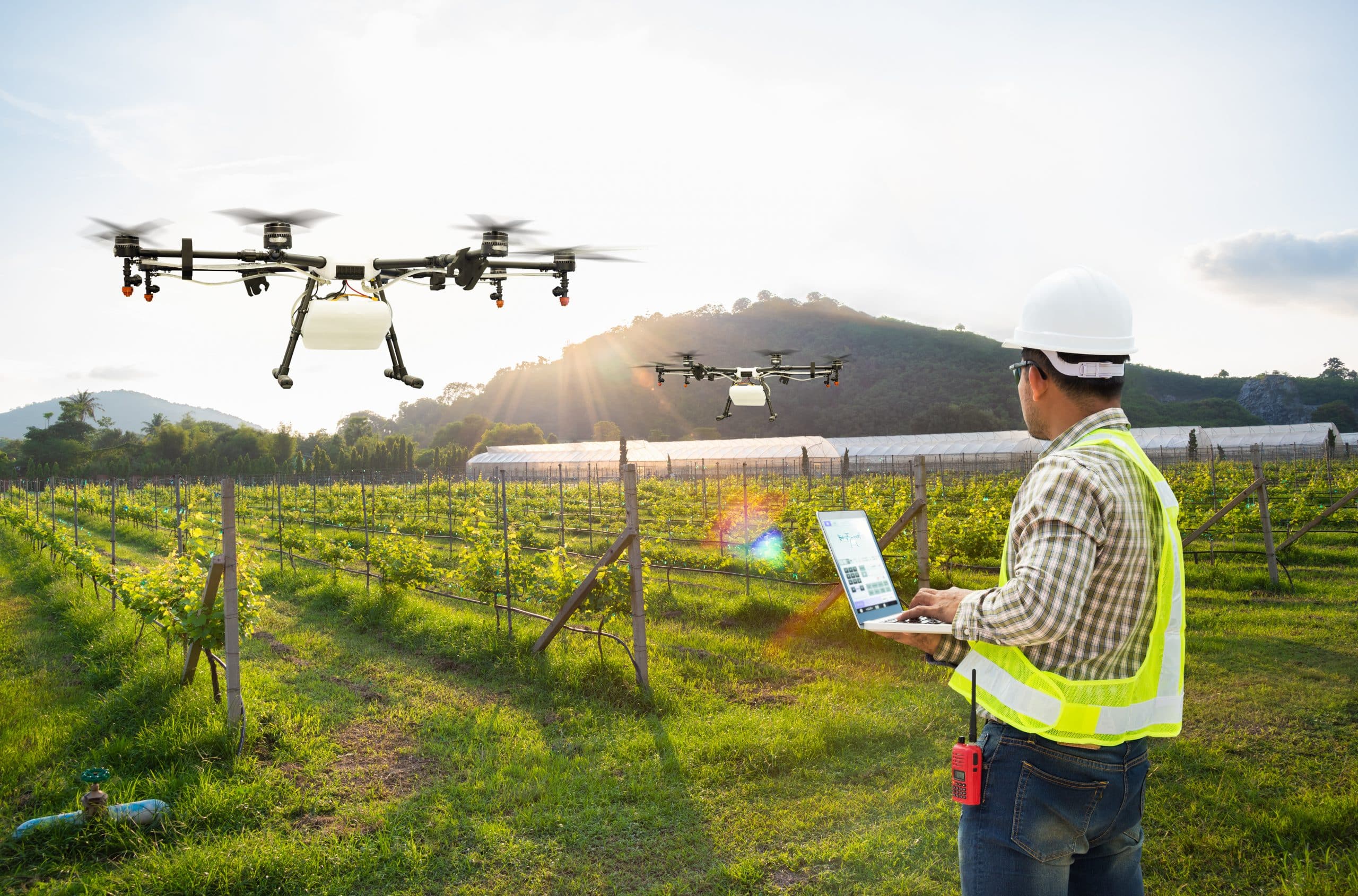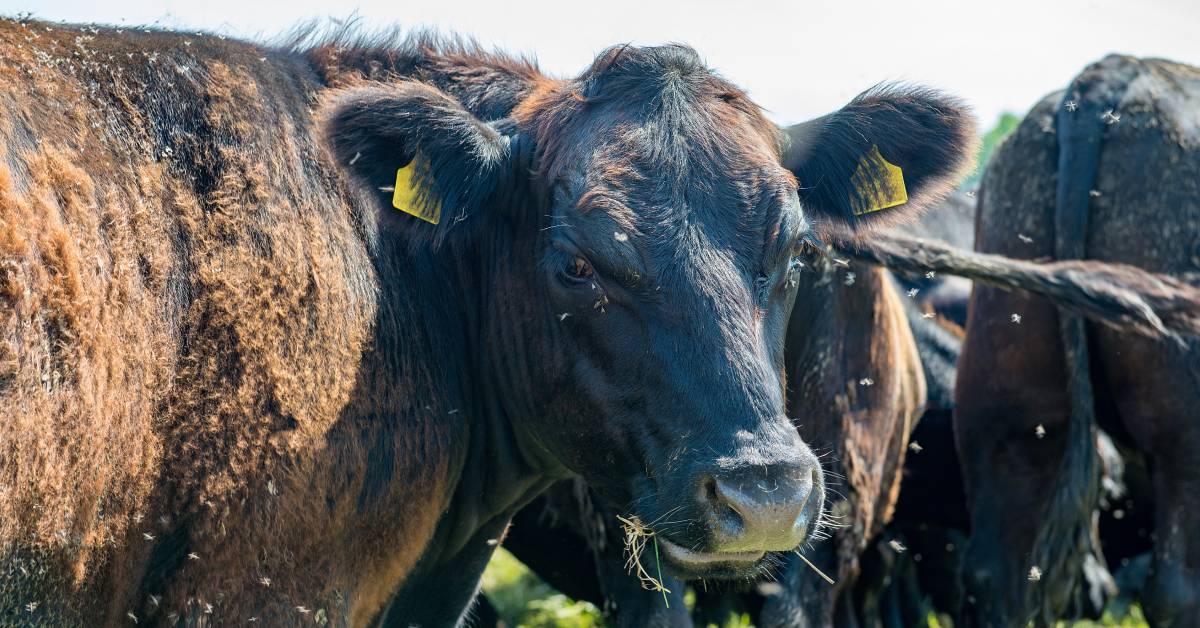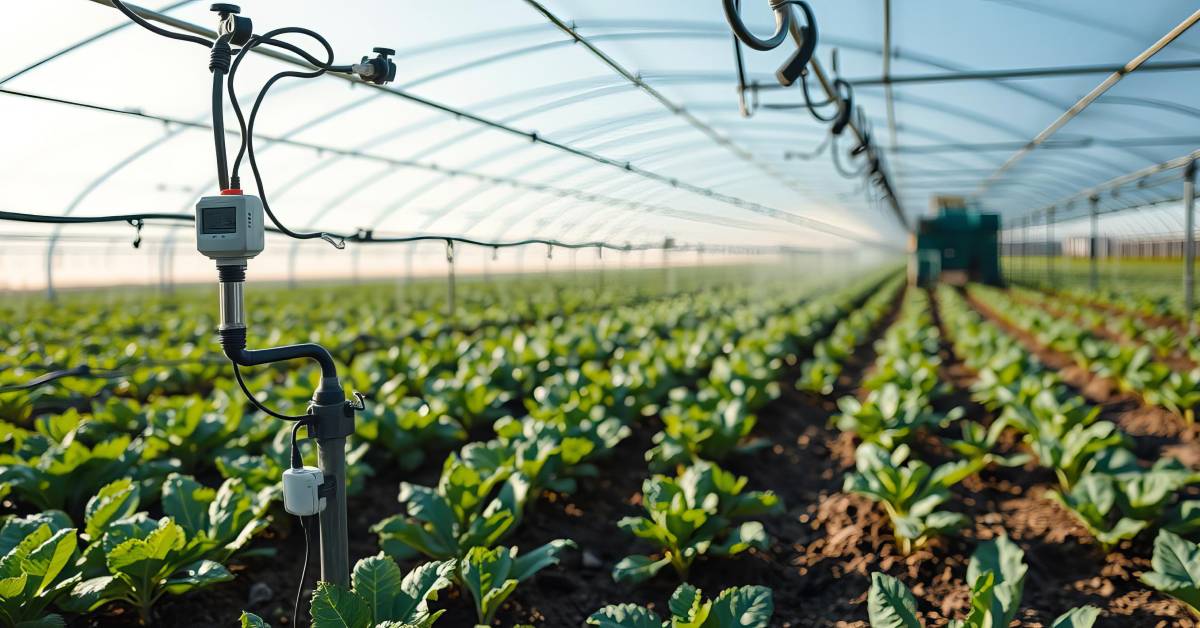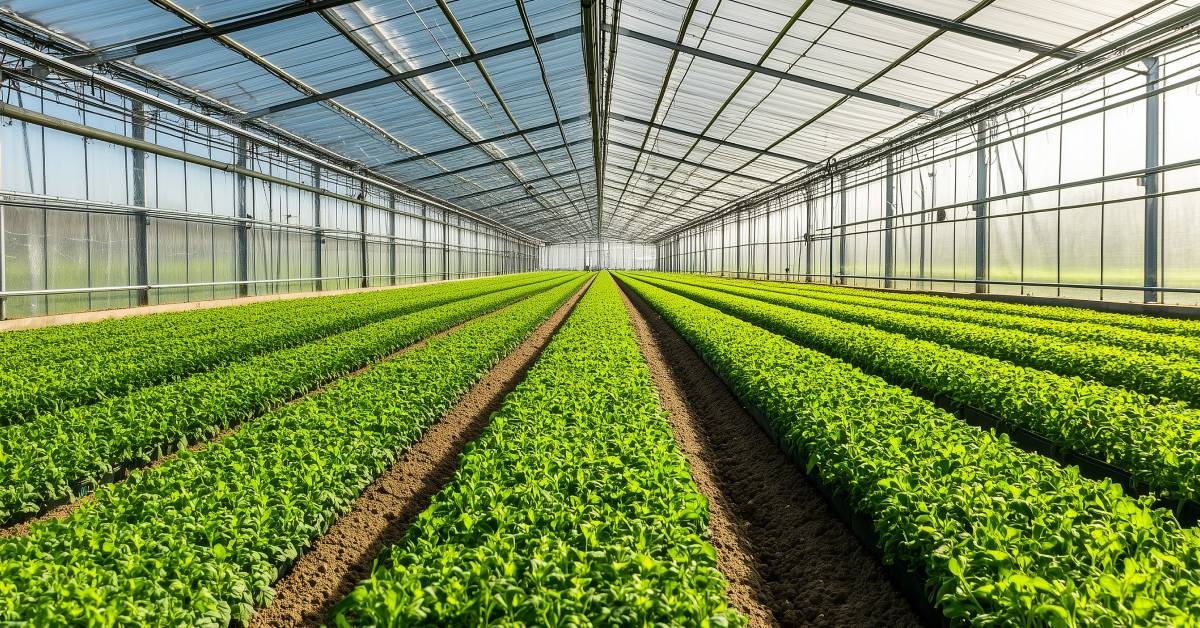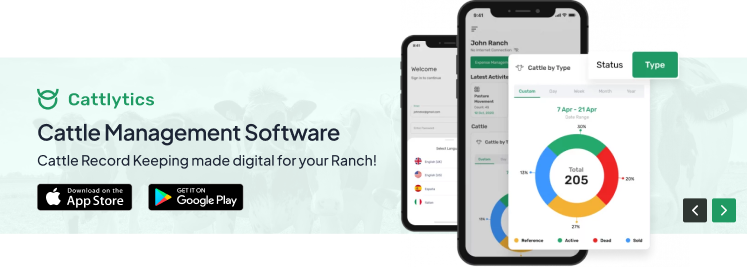AI in Agriculture plays an important role in researching crop diseases, enabling timely intervention, and reducing crop loss. Artificial intelligence, particularly digital transformation in agriculture, enhances decision-making and optimizes resource utilization. This leads to increased productivity and minimized waste in agriculture.
The increasing global population, expected to reach 9.8 billion by 2050, is creating substantial demands on the agricultural sector to boost crop production and optimize yields. In response to imminent food shortages, there are two main strategies under consideration: expanding land usage and implementing large-scale farming techniques.
Artificial Intelligence (AI) in agriculture is revolutionizing the farming sector through predictive analytics, automation, and crop disease detection. It takes effective measures for accurate weather forecasting and identifying potential threats.
Moreover, the evolution of farm automation technology has started to reshape the agricultural landscape. The primary goal for this advancement is to develop innovative systems for quality control, traceability, compliance practices, and beyond.
This evolution illustrates the adaptive and resilient nature of agriculture, ready to embrace the future through AI technology.
Impact of AI on Agriculture
Artificial Intelligence (AI) has emerged as a game-changer in agriculture. It has redefined traditional farming practices and paved the way for farm automation technology.
Impact of AI on Agriculture Artificial Intelligence (AI) has emerged as a game-changer in agriculture. It has redefined traditional farming practices and paved the way for farm automation technology. Embracing the AI app trend, farmers use data-driven insights from advanced AI applications to make more informed decisions, enhancing yield predictions and optimizing resource allocation across their operations. The integration of AI and the use of advanced hardware like H200 GPUs accelerates the processing of vast datasets, enabling more efficient farm management.
Farming is essential to every country, ensuring a stable food supply. With the global population on the rise and climate patterns shifting, farmers can make data-driven decisions, predict potential risks, and maximize the overall farming process.
The subsequent sections will dive deeper into the multifaceted impacts of AI in agriculture:
Enhanced Decision-Making:
Data reigns supreme in today’s digital market. Therefore, it’s important that the agriculture sector uses data to unlock every aspect of the farming process.
Data-driven insights empower farmers with deep knowledge of yield generation. Thanks to AI-powered predictive analytics, agribusinesses experience a transformative journey. It helps AI farmers gather and process vast amounts of data in record time, analyze market demand, forecast prices, and determine optimal times for sowing and harvesting.
Increased Efficiency and Productivity:
Agricultural automation systems significantly impact efficiency through real-time insights about crop health, resource optimization, and automation of tasks such as planting and harvesting.
With the help of predictive analytics, potential issues can be anticipated, thereby reducing the risk of crop failure. These advancements driven by AI not only streamline operations but intensify productivity in the farming industry.
Crop Monitoring and Disease Detection:
Crop management AI transforms agriculture by enabling real-time crop monitoring and early disease detection through advanced sensors and machine learning. This proactive approach empowers farmers with timely actions, minimizes crop losses, and optimizes productivity.
Precision Farming and Resource Optimization:
Precision farming uses advanced technology and data to optimize farming practices for maximum efficiency. With the integration of AI, precision agriculture has become more accurate and efficient than ever.
This facilitates informed decisions on resource allocation like water, fertilizer, and pesticides, reducing waste and improving crop yield. AI-powered automation further helps in resource management through automated processes.
Addressing Agricultural Challenges with AI Solutions
Challenges in Agriculture:
Physical Space
Population growth and urbanization limit arable land, posing challenges for agricultural automation systems—factors like overuse and pollution cause soil degradation. Therefore, sustainable farming practices are needed for food security.
To address these challenges, balancing urban development with sustainable solutions is vital.
Finite Resources
Finite resources like fossil fuels and water challenges in agriculture raise concerns about long-term reliability. Addressing this involves transitioning to methods with fewer resource demands, which can ensure food production and protect farmers’ livelihoods.
Moreover, the current agricultural scenario heavily relies on fossil fuels for machinery and other inputs. These practices exert immense pressure on limited and increasingly scarce water resources used for irrigation.
Environmental Impact
Modern agriculture’s impact on the environment poses a significant threat to long-term food sustainability. The use of chemicals in farming practices contributes to water pollution, leading to adverse effects on aquatic ecosystems.
Moreover, the loss of biodiversity from intensive agricultural practices hinders the resilience of ecosystems and their ability to adapt to changing conditions.
Infrastructural Barriers
Infrastructural barriers and regulations make it difficult to adopt sustainable farming. Collaboration can overcome these hurdles, benefiting the environment and food security.
Investing in sustainable agriculture enhances resilience to climate change and reduces costs, promoting a healthier and more sustainable future.
Demand for Higher Crop Yield
Meeting the demand for higher crop yields in agriculture is vital, especially in the face of limited resources and environmental impacts. Collaboration among governments, organizations, and consumers is essential to promote sustainable methods and ensure a healthier agricultural future.
AI Solutions for Agriculture
Data Drive Decision-Making and Predictive Analytics
Data-driven decisions and predictive analytics are vital in sustainable agriculture. Also, to improve the accuracy of predictions, employing diffusion models can provide a more refined understanding by processing data through a unique learning approach that progressively reconstructs it. Using technologies like remote sensing and machine learning, these tools predict weather, detect pests, and optimize crop performance.
Precision Farming
Implementing a farm management strategy provides a significant advantage. Now, precision farming optimizes operations by utilizing data from soil sensors, drones, satellite imagery, and GPS. This comprehensive monitoring of crop health and weather patterns empowers farmers to make well-informed decisions.
Predictive Analytics
The application of predictive analytics, fueled by the ongoing digital transformation in agriculture, is driving a revolution in farming practices. By analyzing data from various sources, such as weather patterns and soil conditions, predictive models can provide accurate forecasts of crop yields.
Eventually, this empowers farmers to make informed decisions about planting, irrigation, fertilization, and pest control. Imagine a farmer using a tablet in his field, accessing real-time data on soil moisture and predicted rainfall patterns.
Based on this information, the farmer can adjust his irrigation schedule, ensuring his crops receive just the right amount of water to thrive. This data-driven approach not only boosts yields but also conserves precious water resources.
Supply Chain Optimization
These days, optimizing the supply chain is crucial for success. It helps you streamline production and distribution, giving you a competitive edge with
- Optimized processes that minimize waste, improving cost-effectiveness.
- Streamlined material flow enhances production speed and responsiveness.
- Proactive monitoring ensures consistent product quality.
- Faster delivery, reliable product availability, and improved quality boost customer satisfaction.
Intelligent Adaptation to Climate Change
As climate change disrupts the food system, intelligent adaptations emerge as one of the most reliable AI solutions for farming. This approach empowers farms to flourish in a changing climate, benefiting farmers, consumers, and the environment. Let’s take a closer look at this win-win-win scenario:
Farm Gains:
- Enhanced resilience with drought-resistant crops and precision irrigation.
- Increased yields and stable income through intelligent adaptation and proactive pest control.
Consumer Perks:
- Climate-resilient farms guarantee a stable food supply during extreme weather.
- Intelligent adaptation enhances food security by maximizing yields and minimizing waste.
Environmental Wins:
- Sustainable practices cut greenhouse gas emissions by using renewable energy and less nitrogen fertilizer.
- Organic farming and composting enhance soil health and carbon sequestration.
Take Kenyan farmers, for example. They rely on satellite data and weather forecasts to guide their planting and irrigation, maximizing water use and yields in drought-prone areas.
By embracing intelligent adaptation, we can build a food system that thrives in the face of climate change, nourishing farms, consumers, and the environment for future generations.
Resource Management
Efficient resource management, achieved through technology and data insights, optimizes farm operations, which cater to the demand for AI applications in agribusiness. Strategic allocation of labor, machinery, and inputs maximizes productivity while minimizing waste, improving efficiency, and creating a positive working environment for farm workers.
Stay Rooted, Grow Informed:
What do Stats Say about the Impact of AI in Agriculture?
Agriculture and AI witness a powerful collaboration, sprouting promising harvests of efficiency, sustainability, and improved yields. Let’s dive into the latest stats and trends, painting a vibrant picture of AI’s current and future impact on this sector:
Current Impact on Agriculture
- Global AI in agriculture is predicted to reach $8.38 billion by 2030, growing at 24.8% CAGR.
- AI can boost crop yields by 10-25% through precision agriculture.
- AI-driven recognition reduces pesticide use by 30-50% by identifying issues early.
Future Potential of AI in Agriculture
- AI-driven robots and drones streamline tasks, boosting efficiency in agriculture.
- AI forecasts crop yields and optimizes planting, enhancing resilience to climate change and improving market readiness.
AI-powered Crop Breeding and Genetic Improvement
AI-powered technologies have revolutionized traditional plant breeding methods by leveraging large datasets and advanced algorithms to accelerate crop development. Here’s what AI-powered crop breeding and genetic improvement can accomplish:
- Genomic Selection: In the field of agriculture, AI is leading to groundbreaking innovations that have a profound impact on global food production
- Phenotypic Analysis: AI conducts phenotypic analysis, closely monitoring plant growth and development. This advanced technology unveils hidden secrets within plant characteristics, providing valuable insights for precision breeding and improved crop outcomes.
- Gene Editing: By precisely manipulating genes, AI contributes to the development of crops with enhanced nutritional value, extended shelf life, and improved resistance to environmental challenges.
- Disease Resistance: AI aids in building defenses against diseases that threaten future harvests. Through sophisticated algorithms and data analysis, AI identifies potential crop vulnerabilities, allowing for proactive measures.
- Trait Discovery: By scrutinizing individual genes, AI assists scientists in understanding and optimizing desirable traits. It paves the way for the development of crops that meet specific agricultural and consumer needs.
Applications of Artificial Intelligence in Agriculture
Weather Prediction for Optimal Farming
AI solutions in farming utilize advanced algorithms, including crop management software, to predict weather patterns. This is crucial for efficient crop management and resource allocation in modern agriculture. Accurate forecasts enable informed decisions, optimizing yield and resource utilization.
Real-Time Soil and Crop Monitoring
Real-time monitoring of soil and crops provides valuable insights for optimizing farming practices. These insights contribute to improved crop quality through informed decisions based on accurate, up-to-date information.
Drones for Data Collection
Utilizing AI and drones in agriculture enhances data collection for real-time surveillance and analytics. This integration empowers farmers to make data-driven choices that optimize their agricultural practices and maximize productivity.
AI-Powered Robots in Agriculture
Robotics in agribusiness utilizes AI-driven robots for tasks like weed control, harvesting, and packing, improving efficiency and precision. In surveillance, AI technology detects and prevents crop damage, with algorithms providing alerts for intrusions.
AI-Enabled Surveillance Systems
AI-driven surveillance in agriculture detects and prevents crop damage. Using advanced algorithms, it identifies intrusions like pests and diseases, provides timely alerts for prompt action, revolutionizes crop protection, and bolsters agricultural efficiency.
Agritech Services for Agricultural Businesses
Farm Management Systems
Advanced farm management systems leverage farm automation technologies to enhance agricultural decision-making. These systems utilize data on weather, soil conditions, and crop health, resulting in improved efficiency and productivity.
Aerial Imaging for Crop Analysis
Aerial imaging services provide a comprehensive perspective of fields, assisting in crop analysis. Real-world applications empower farmers with valuable insights for informed decision-making by detecting issues early and allocating resources precisely.
Vertical and Indoor Farming Solutions
In urban farming, tools for climate control and yield monitoring are important. These solutions, integrating intelligent crop breeding and detailed management, help farmers optimize resources and achieve sustainable practices for urban agriculture.
Crop Management
Efficient crop management AI involves strategic planning and execution to optimize yields. This encompasses tasks such as planting, irrigation, and pest control, where intelligent decision-making based on data-driven insights ensures resource efficiency and overall crop health.
Intelligent Crop Breeding
Integrating artificial intelligence into crop breeding redefines the process, enabling precision and efficiency. By analyzing genetic data and traits, intelligent crop breeding facilitates the development of resilient and high-yielding varieties customized to meet specific agricultural requirements.
Food Safety Software
Specialized food safety software optimizes quality control, traceability, and compliance processes in the food industry. This innovative technology enables real-time monitoring, efficient documentation management, and comprehensive risk assessment.
Importance of Agriculture Custom Software Development
Custom Software
Custom software, like livestock management software, plays a vital role in automating agricultural workflows and streamlining tasks such as livestock monitoring and pest management. Specific examples include the automation of data collection in livestock farming and the use of software-driven pest detection systems. Partnering with experts in custom software development services can further enhance these agricultural solutions, ensuring that the software is tailored to meet the specific needs and challenges of the industry.
Planning through Data Analytics
Data analytics and visualization tools in agriculture allow proactive planning. These tools help farmers make informed decisions, optimize resource allocation, and enhance overall efficiency.
Farm Management with Digital Tools
Digital tools provide farmers with remote control possibilities for better farm management. These tools contribute to more efficient and responsive agricultural practices.
Maximizing Nutritional Value
Custom tracking systems are instrumental in maximizing the nutritional value of agricultural products. These systems allow for adjustments in treatment processes to enhance crop quality and quantity.
Cost Reduction and Sustainability Goals
Precision agriculture, facilitated by custom software, optimizes resource utilization while minimizing waste and costs. This innovation aligns with agriculture’s sustainability goals, fostering environmentally friendly practices and contributing to the overall efficiency of farming operations.
Future of AI in Agriculture
Framework for Transparency
Implementing a transparency framework in agribusiness is essential for fostering openness and trust. This framework ensures clear communication and information-sharing practices, providing stakeholders, including farmers, with insights into decision-making processes.
Data Privacy and Protection
Robust measures to secure agricultural data, including encryption protocols and access controls, are needed to maintain data privacy and protection.
Education and Awareness
Comprehensive training programs ensure stakeholders are well-versed in data privacy, ethical AI use, and the framework. This fosters a culture of responsible data handling within the agricultural community.
Usability and Accessibility
Prioritizing user-friendly interfaces and clear guidelines enhances the framework’s adoption. It ensures accessibility for stakeholders with varying technical expertise.
AI Ethics and Fairness
Integrating AI ethics and fairness principles guides the development and deployment of AI technologies while addressing biases and promoting ethical standards in agriculture. Incorporating artificial intelligence development services can ensure that these ethical guidelines are adhered to while enhancing the efficiency and effectiveness of AI applications in agriculture.
Strategy Implementation
A well-defined strategy, including clear milestones, responsibilities, and feedback mechanisms, is crucial for the framework’s practical and impactful implementation within the agricultural landscape.
Use Cases of AI in Agriculture
Use Case 1: Crop Monitoring
The need for crop monitoring arises from the complexity of managing large agricultural spaces and ensuring the health and well-being of crops and livestock.
By leveraging advanced technologies in agricultural artificial intelligence, such as image recognition and data analytics, these monitoring systems can provide real-time insights into crop conditions and animal health.
Use Case 2: Building and Equipment Management
In agriculture, efficient building and equipment management is essential for streamlined operations. With the integration of AI technologies, including smart sensors and predictive analytics, building and equipment management becomes more proactive and responsive.
These tools enable farmers to monitor the condition of structures, predict maintenance needs, and optimize equipment usage. This resource proves invaluable for minimizing downtime, reducing operational costs, and ensuring the longevity of agricultural infrastructure.
Use Case 3: Autonomous Farming Machinery
The use of autonomous farming machinery addresses the pressing need for increased efficiency and labor optimization in agriculture. Through the incorporation of agricultural artificial intelligence, autonomous machinery can perform tasks such as planting, harvesting, and spraying with precision and efficiency. This resource proves indispensable for farmers, allowing them to achieve higher yields and optimize resource usage. Partnering with an AI development company can help farmers leverage the power of AI to modernize their operations and unlock the full potential of autonomous farming technology.
Frequently Asked Questions (FAQs)
What Are the Main Benefits of AI in Agriculture?
Artificial intelligence (AI) in agriculture provides numerous benefits, including data-driven decision-making, cost savings through precision agriculture, and automation through technologies like driverless tractors and agricultural drones.
What Challenges Does AI Face in Agriculture Adoption?
Challenges in the agricultural sector include significant upfront expenses, hesitancy towards adopting new technologies, limited practical experience, time-consuming technology adoption procedures, technological limitations, and concerns regarding privacy and security.
How Can Partner With an AI Software Development Company Benefit Agriculture Businesses?
Collaborating with an AI software development company brings valuable expertise in creating tailored solutions for farm management, vertical farming, and precision agriculture.
What Is the Future Outlook for AI in Agriculture?
The future of AI in agriculture holds great promise, offering solutions to global challenges, enhancing efficiency, and promoting sustainable farming practices. Through the implementation of AI-powered tools and automation, the role of farmers will be redefined, highlighting the importance of education and training in AI solutions.
Conclusion
Looking ahead, the future of AI in agriculture is extremely promising. Predictions indicate a continued evolution toward more sophisticated AI applications, including advanced predictive analytics, autonomous machinery, and personalized farming solutions.
These innovations are poised to optimize resource management further, increase crop yields, and contribute to the overall resilience and adaptability of agriculture in the face of evolving challenges.
The journey of AI in farming is an ongoing exploration. AI continuously enhances agricultural practices for a resilient and prosperous future of global food production. As we embrace this change, the evolving relationship between artificial intelligence and agriculture addresses current agricultural needs and positions the industry for sustainable growth.

